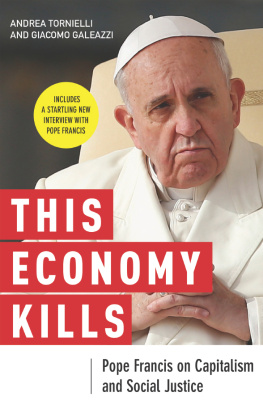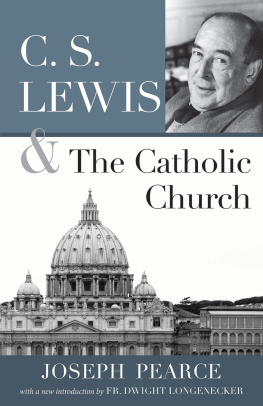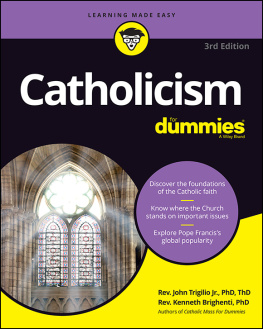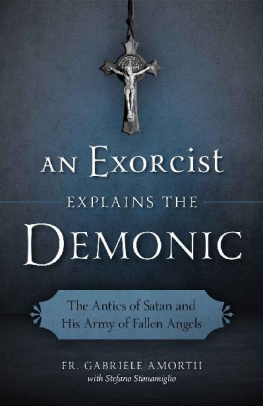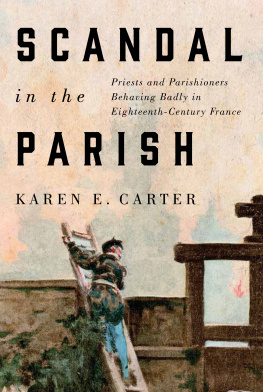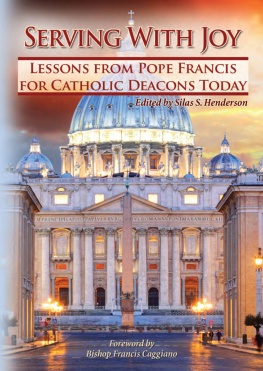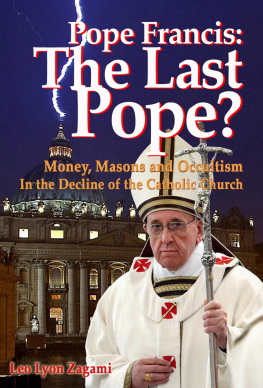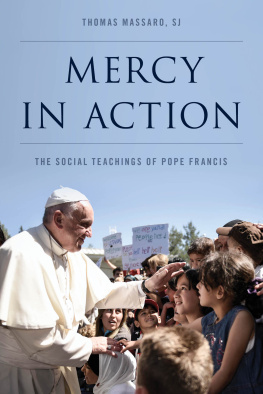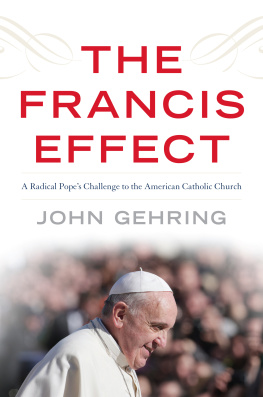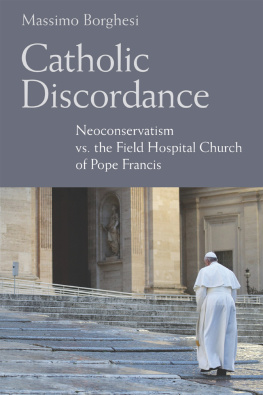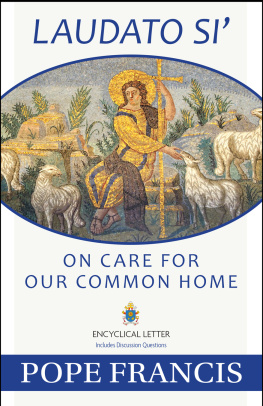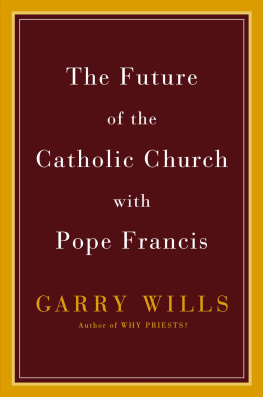The book provides readers with the background in church social teaching they need to understand what the pope is saying. And, best of all, Tornielli and Galeazzi let Pope Francis speak for himself, presenting here the full text of an interview with the pope precisely on his comments about the economy.
Cindy Wooden
Rome Bureau Chief, Catholic News Service
Tornielli and Galeazzi bring into focus one of Popes Franciss fundamental concerns. They are meticulous in probing his writings and pronouncements on economic and financial matters, concern for the poor, defense of creation, and the big business of war. They also look seriously at the Popes toughest critics. But the real value of this book is that Tornielli and Galeazzi bring us into an almost personal dialogue with Pope Francisespecially through an exclusive interviewand help us see how his authentic concern for all people, especially those who are poor and forgotten, is at the heart of his ministry.
Robert Mickens
Editor, Global Pulse Magazine
This Economy Kills provides a valuable window into Pope Franciss sophisticated understanding of Catholic social teaching, the economy, and the signs of the times.
Meghan Clark
Author of The Vision of Catholic Social Thought
This Economy Kills settles an important question in the papacy of Pope Francis: are his radical economics in keeping with the tradition of the Church? And if so, why do they seem to cause such upset among American conservatives? For Tornielli and Galeazzi, veteran Vatican reporters, the answer is clear: Pope Franciss theology is absolutely in keeping with predecessors from the Desert Fathers to the most recent popes, and his economics represent the application of this timeless theology to our most pressing contemporary problems. Understanding Pope Franciss approach to modern economic ills will likely be key to understanding his papacybut his contributions to global dialogue on poverty and inequality will be integral to galvanizing people worldwide for change. Tornielli and Galeazzi narrate these different aspects of Franciss message expertly, and their insights could not be more timely.
Elizabeth Stoker Bruenig, The New Republic
Original Italian edition:
Papa Francesco
Questa Economia Uccide
2015 Edizioni Piemme Spa
Milano - Italy
www.edizpiemme.it
Cover design by Stefan Killen Design. Cover photo: CNS photo/Paul Haring.
2015 by Order of Saint Benedict, Collegeville, Minnesota. All rights reserved. No part of this book may be reproduced in any form, by print, microfilm, microfiche, mechanical recording, photocopying, translation, or by any other means, known or yet unknown, for any purpose except brief quotations in reviews, without the previous written permission of Liturgical Press, Saint Johns Abbey, PO Box 7500, Collegeville, Minnesota 56321-7500. Printed in the United States of America.
The Library of Congress has cataloged the printed edition as follows:
Library of Congress Control Number: 2015936995
ISBN 978-0-8146-4725-7 978-0-8146-4704-2 (ebook)
CONTENTS
Preface
IS THE POPE A MARXIST?
Francis, the Economy that Kills, and the Catholic Amnesia
When I give food to the poor, they call me a saint. But when I ask why the poor have no food, they call me a communist.
Hlder Cmara, Archbishop of Recife
Today we also have to say thou shalt not to an economy of exclusion and inequality. Such an economy kills. How can it be that it is not a news item when an elderly homeless person dies of exposure, but it is news when the stock market loses two points?...
Some people continue to defend trickle-down theories which assume that economic growth, encouraged by a free market, will inevitably succeed in bringing about greater justice and inclusiveness in the world. This opinion, which has never been confirmed by the facts, expresses a crude and nave trust in the goodness of those wielding economic power and in the sacralized workings of the prevailing economic system. Meanwhile, the excluded are still waiting.
It took a few sentences, a handful of words, a few scant paragraphs in a large and complex document dedicated to evangelization, or rather to the joy of the gospel. Pope Francis, eight months after his election to the papacy, after publishing the exhortation Evangelii Gaudium, was branded a Marxist by conservative commentators from the United States. And some time later, The Economist even called him a follower of Lenin for his diagnosis of capitalism and imperialism. Jorge Maria Bergoglio, the Argentinian Jesuit, whoas superior of the Society of Jesus in his country and then as archbishop of Buenos Aireswas known for never having adopted certain extreme theses of liberation theology to the point of being accused of conservatism, found himself compared to the philosopher of Trier and to his many followersincluding the architect of the Bolshevik revolution. But even more striking than the crude allegations of Marxism and Leninism are the criticisms and caveats on this issue that began before the publication of the popes apostolic exhortation and have persisted ever since. This pope speaks too much of the poor, the marginalized, the underprivileged. This Latin American pope does not know much about economics. This pope coming from the end of the world demonizes capitalismthat is, the only system that allows the poor to be less poor. Not only does this pope make politically incorrect decisions (as when he went to the island of Lampedusa to pray in front of the sea that had become the graveyard of thousands of migrants, desperately searching for hope in Europe, and who instead drowned off the coast of the island), but he also interferes in matters that are none of his business, thus revealing himself to be a pauperist. The Italian newspaper Il Foglio, which during Benedict XVIs pontificate was known as Il Soglio (The See of Peter), even went so far as to call the Argentinian popes words heretical and find him guilty of referring to the poor and the suffering as the flesh of Christ. This was after embracing and blessing, for an hour and in silence, seriously ill children and young people in Assisi.
However, what is most surprising is not so much the shallowness of the allegations, but rather the apparent oblivion in which a substantial part of the great tradition of the church has fallena tradition that spans the church fathers to the magisterium of Pope Pius XI, born Achille Ratti, hardly a modernist or progressive.
For certain establishments and in certain circles, it is acceptable to speak of the poor, as long as it is done infrequently and especially as long as it is done in ways that are welcome in certain spheres. A bit of charity mixed with good feelings is fine. It helps to appease the conscience. Just do not overdo it. And, above all, do not dare to question the systema system that, according to many Catholics, is the best of all worlds for the marginalized because it teaches the right theories. The wealthier the rich become, the better it is for the poor. This system has even become dogma in some Catholic circles, like other truths of faith. As a certain adage goes: Christianity is freedom, freedom is free enterprise (and, therefore, capitalism); hence, capitalism is Christianity in action. And of course we should not quibble about the fact that we live in an economy that has little or nothing to do with capitalism, as its connection with the so-called real economy is almost nil. The financial bubble, speculation, the stock market indices, the fact that the oscillation of those indices can hurl entire populations below the poverty line as it suddenly pushes up the price of some raw materialsall these are realities that we are asked to accept in the same way as the side effects of the smart wars of this last generation. Not only do we have to accept them, we also have to stay silent. Dogma is dogma, and whoever calls it into question is, at best, an idealistor, worse, a dissident. Yes, because even before the catastrophe of the economic and financial crisis of recent years, all that the church, and Catholics more generally, are allowed to do is to make some appeals for more ethics. True, finance needs ethics! Those who operate in those spheres ought to have well fixed in mind the principles of natural morality, better still, of Christian morals. Without ethics, the world, we can see it for ourselves, is falling apart. But be careful not to go any further. Never try to lift a finger or to say that the emperor is naked; never put into question the sustainability of the current system. Never wonder whether it is right that those who die of hunger or cold, whether in Africa or in the streets below our houses, make less news than when the stock market loses two points, as it has often been observed by the man who sits on the throne of Peter today. Then you are called a Marxist, a pauperist, a poor dreamer from the end of the world, who needs to be catechized by those who, here in the West, know everything of how the world and the church go, and are just waiting to be able to teach it to you.

